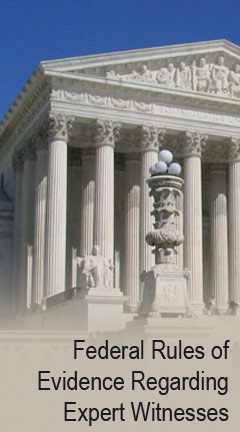Archival Notice
This is an archive page that is no longer being updated. It may contain outdated information and links may no longer function as originally intended.
Home | Glossary | Resources | Help | Course Map
Appointment
The court may, on its own motion or on the motion of any party, enter an order to show cause why expert witnesses should not be appointed and may request the parties to submit nominations. The court may appoint any expert witnesses agreed upon by the parties and may appoint witnesses of its own selection.
An expert witness shall not be appointed by the court unless the witness consents to act. A witness so appointed shall be informed of the witness's duties by the court and in writing — a copy of which shall be filed with the clerk or at a conference in which the parties shall have the opportunity to participate.
A witness so appointed shall advise the parties of the witness's findings, if any; the witness's deposition may be taken by any party; and the witness may be called to testify by the court or any party. The witness shall be subject to cross-examination by each party, including a party calling the witness. [FRE 706(a)]
Compensation
Expert witnesses appointed by the court are entitled to reasonable compensation. The compensation thus fixed is payable from funds which may be provided by law in criminal cases. [FRE 706(b)]
Disclosure of Appointment
In the exercise of its discretion, the court may authorize disclosure to the jury of the fact that the court appointed the expert witness [FRE 706(c)].
Parties' Experts of Own Selection
Nothing in this rule limits the parties in calling expert witnesses of their own selection. [FRE 706(d)]
Additional Online Courses
- What Every First Responding Officer Should Know About DNA Evidence
- Collecting DNA Evidence at Property Crime Scenes
- DNA – A Prosecutor’s Practice Notebook
- Crime Scene and DNA Basics
- Laboratory Safety Programs
- DNA Amplification
- Population Genetics and Statistics
- Non-STR DNA Markers: SNPs, Y-STRs, LCN and mtDNA
- Firearms Examiner Training
- Forensic DNA Education for Law Enforcement Decisionmakers
- What Every Investigator and Evidence Technician Should Know About DNA Evidence
- Principles of Forensic DNA for Officers of the Court
- Law 101: Legal Guide for the Forensic Expert
- Laboratory Orientation and Testing of Body Fluids and Tissues
- DNA Extraction and Quantitation
- STR Data Analysis and Interpretation
- Communication Skills, Report Writing, and Courtroom Testimony
- Español for Law Enforcement
- Amplified DNA Product Separation for Forensic Analysts


